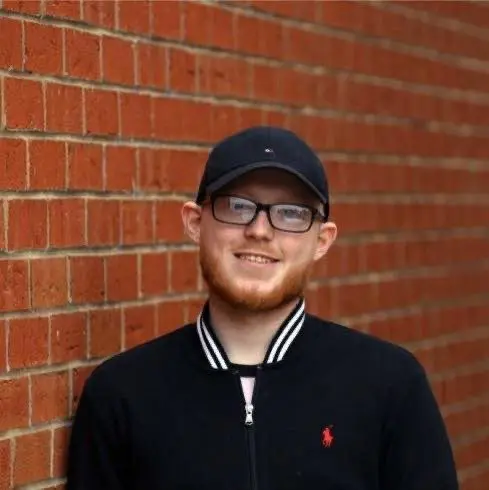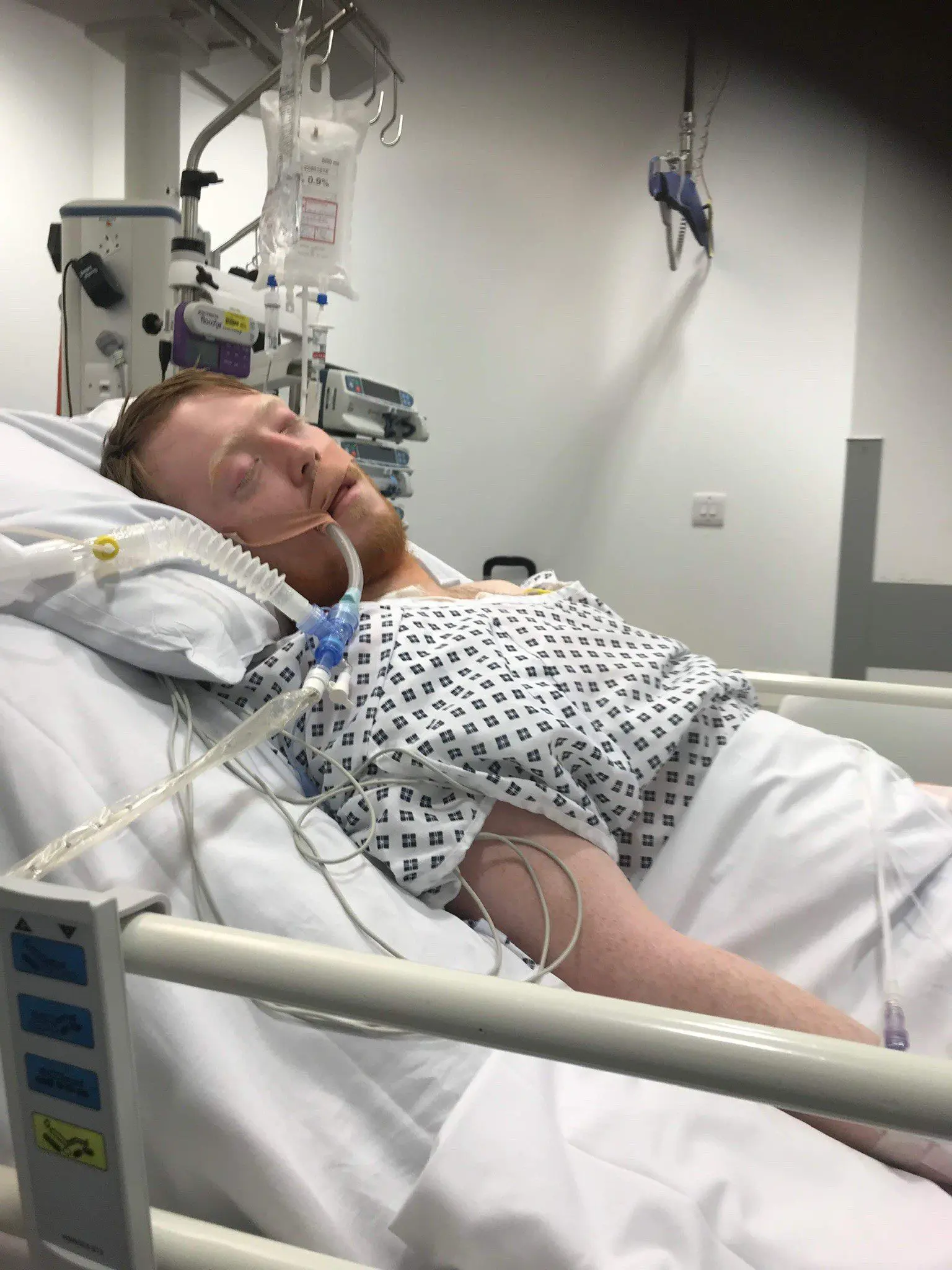Ainsley’s story: “I thought ‘I’m 21 it won’t be cancer’”
“I never ever thought I would have cancer. I thought ‘I’m 21 it won’t be cancer’. I was shocked when they said it was a brain tumour. You never forget that moment, I don’t anyway.”
Ainsley and his brothers were spending the day doing a task no son wants to do; clearing out their Dad’s house after he had just passed away. It was no wonder Ainsley had been having such horrible headaches, it was tough, he was drained. But they just wouldn’t go away.
“I couldn’t help. I was just underneath a blanket in the dark, I couldn’t open my eyes.”
Ainsley’s Mum was getting concerned. They went to the GP, who said it’s just a migraine. But a couple of days later he started being sick. That can’t be right?, he thought.
“I went up there and at this point, I’d started being sick. Every time they were doing my eyes, I was being sick straight after.”

Ainsley was diagnosed with a brain tumour at 21
Ainsley was later told to visit A&E to get a full health test done. Just as he got to the entrance of the hospital, with his Mum one side and Great Aunt the other, Ainsley collapsed on the floor.
“ I woke up and I was on a makeshift bed. I had all the nurses round me and I said ‘where’s my mum? what’s going on?’ They got my mum in but then I started going numb on one side of my body – my legs and hands – and my heart rate was really low. I think I’d just got some fluids and medication and they sent me for a scan.
“They came back and said you’ve got a mass on the brain. I said ‘I’ve never heard of that, what is it?’ and they said it could be a number of things, so we’ll just say that for now.”
Ainsley was taken to theatre for an operation to try and remove the blockage to his brain and get the fluid moving around freely again. They also did a biopsy to see if it could be cancer. The test came back inconclusive.
Two days after the operation, it was his dad’s funeral. The nurses were advising him not to go, but he knew he had to.
“I said ‘I understand that, but I’ve got to go. Otherwise I won’t live it down for the rest of my life if I don’t go’. They said we’ll let you go, because it’s up to you, we can’t force you not to go but would it be alright if a nurse came with you.
“So I went to the funeral – I was meant to be carrying the coffin but obviously I couldn’t because I was weak. Then straight after I got rushed back up to the ward – where I’d had the operation it was starting to be a bit swollen. I got back to the hospital and I just slept all day.”
Later, as Ainsley was recovering after the emotions of the day, they did blood tests to check for tumour markers, and the results showed he had a brain tumour.
“My first question, which I think is probably everyone’s first question, was ‘how long have I got?’ and they said your chances are quite good for survival. They had a plan where I was going to have chemotherapy for a little bit, a couple of treatments of that and then because of where the tumour was, it was quite dangerous to operate, so they said if they can shrink it a bit and then operate and then they’ll do some radiotherapy. That was the original plan.
“After my first treatment I was really ill on chemo. I was sleeping all day, I was being sick all day, I was really weak. So they rushed me for an MRI – I think I was the last MRI of the day – and it turned out my tumour had haemorrhaged. All my family had to come in and I had to get rushed to the RVI. When I was going for the ambulance, all the nurses were out in the corridor crying, that’s what my Mum said because I was unconscious at the time, they thought this doesn’t look good and chances are against him this time.
“I got rushed to the RVI and I had surgery – I was in for about ten hours. I came out and I was in an induced coma to rest. By this time all of my family were in a room to themselves, just in case anything bad happened and to give them a bit of privacy. I came out of the operation and I got put into intensive care for four days and then the high dependency ward and then finally back onto the ward and then finally back to the Freeman hospital to slightly change the treatment and continue the treatment.”

Ainsley had surgery and was put in a coma to rest
Ainsley experienced a range of side effects from the chemotherapy, including the loss of mobility.
“I don’t know if it was a mixture of the brain tumour, where it was, and me being in bed for a long time but I had to learn to walk again. The nurses and my mum helped us regain the strength in my legs and try to walk. Mum would hold us one side and I’d hold on to a rail and walk down the corridor and then I’d do it without the rail, with just my Mum, and I progressed and got back to walking. It probably took a few months for us to get back to walking by myself. I had a physiotherapist as well who would give me stretches to do.”
As well as the physical side effects, there was also an impact on Ainsley’s mental health too.
“It just made me more unhappy – the physical side everyone knows about but nobody knows about how it affects you mentally. I was thinking, I’m going to be walking funny, I have to get glasses as a result, I’d lost my hair and I think that brought my baldness on ten years quicker because it hasn’t regrown properly so I’m now a baldy. It was just a lot of things. I think when you’re going through something like that I just try to look at the positives and I think you’ve always got a positive in your life, so look towards them instead of looking at the negatives. Obviously, I had my Mum there basically 24/7, she was there in hospital every night nearly. I think having someone can stop you having a mental problem, being depressed.”
After chemotherapy, Ainsley and his Mum flew out to Germany where he had radiotherapy. His Young Lives vs Cancer Social Worker Eve helped to sort the trip out so that all they had to worry about was remembering their passports.
Ainsley was in his third year at university when he was given the news of his diagnosis. Eve helped Ainsley navigate telling his university as well as sitting his exams to finish his degree.
“I don’t think I could have [sorted things out with uni myself], not at the start. I was very unwell and I couldn’t really do much. That’s why Eve said ‘I’ll do it for you, I’ll get on to them’. I don’t think they knew before Eve got in contact with them, they must have thought ‘he’s been absent for a couple of weeks’ but Eve sorted it out and it was brilliant the set up they did for me. I had talks with my tutors and lecturers all the time to see how I was getting on and if I wasn’t getting it, they would help us all the time. I think that probably wouldn’t have happened without Eve giving them a heads up. I went back and finished my degree and came out with a 2:1.”
Eve supported Ainsley and his family every step of the way throughout his treatment and especially once he was out of hospital and at home, as he started to find his way back in the world again.
“I found it really tough. I’d been in this bubble for a year and a half and all that time I’d just been in a hospital, I didn’t really have much of a life outside of the hospital when I came home. Then suddenly when I got my life back I was like ‘woah, what do I do now?’ I was back in the big, bad world. I was like ‘what do I do? How do I live my normal life? What is my normal life?’ I did struggle to think what do I do – Eve again was there when I was having bad day I’d say ‘oh Eve I’m not having a good day’ and same with Gemma at the hospital, they were both checking in on us.”
Now, after achieving a 2:1 in his degree, Ainsley has applied to do a masters too.
“I’ve applied for a masters in physiotherapy. I sent Eve my personal statement, she read through it and she did some corrections, so I was very grateful for that as well.”
Posted on Monday 23 August 2021